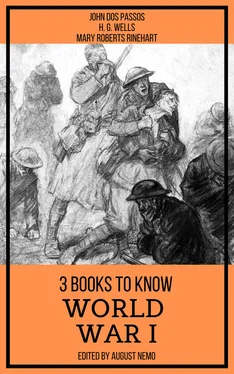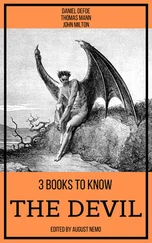1 ...8 9 10 12 13 14 ...39 “When I thinks to myself how much the folks need me home, it makes me feel sort o' confident-like, I dunno why. I juss can't cash in my checks, that's all.” He laughed jovially.
No one joined in the laugh.
“Is it awfully catchin'?” asked Fuselli of the man next him.
“Most catchin' thing there is,” he answered solemnly. “The worst of it is,” another man was muttering in a shrill hysterical voice, “bein' thrown over to the sharks. Gee, they ain't got a right to do that, even if it is war time, they ain't got a right to treat a Christian like he was a dead dawg.”
“They got a right to do anythin' they goddam please, buddy. Who's goin' to stop 'em I'd like to know,” cried the red-faced man.
“If he was an awficer, they wouldn't throw him over like that,” came the shrill hysterical voice again.
“Cut that,” said someone else, “no use gettin' in wrong juss for the sake of talkin'.”
“But ain't it dangerous, waitin' round up here so near where those fellers are with that sickness,” whispered Fuselli to the man next him.
“Reckon it is, buddy,” came the other man's voice dully.
Fuselli started making his way toward the door.
“Lemme out, fellers, I've got to puke,” he said. “Shoot,” he was thinking, “I'll tell 'em the place was closed; they'll never come to look.”
As he opened the door he thought of himself crawling back to his bunk and feeling his neck swell and his hands burn with fever and his arms and legs stiffen until everything would be effaced in the blackness of death. But the roar of the wind and the lash of the spray as he staggered back along the deck drowned all other thought.
Fuselli and another man carried the dripping garbage-can up the ladder that led up from the mess hall. It smelt of rancid grease and coffee grounds and greasy juice trickled over their fingers as they struggled with it. At last they burst out on to the deck where a free wind blew out of the black night. They staggered unsteadily to the rail and emptied the pail into the darkness. The splash was lost in the sound of the waves and of churned water fleeing along the sides. Fuselli leaned over the rail and looked down at the faint phosphorescence that was the only light in the whole black gulf. He had never seen such darkness before. He clutched hold of the rail with both hands, feeling lost and terrified in the blackness, in the roaring of the wind in his ears and the sound of churned water fleeing astern. The alternative was the stench of below decks.
“I'll bring down the rosie, don't you bother,” he said to the other man, kicking the can that gave out a ringing sound as he spoke.
He strained his eyes to make out something. The darkness seemed to press in upon his eyeballs, blinding him. Suddenly he noticed voices near him. Two men were talking.
“I ain't never seen the sea before this, I didn't know it was like this.”
“We're in the zone, now.”
“That means we may go down any minute.”
“Yare.”
“Christ, how black it is.... It'ld be awful to drown in the dark like this.”
“It'ld be over soon.”
“Say, Fred, have you ever been so skeered that...?”
“D'you feel a-skeert?”
“Feel my hand, Fred.... No.... There it is. God, it's so hellish black you can't see yer own hand.”
“It's cold. Why are you shiverin' so? God, I wish I had a drink.”
“I ain't never seen the sea before...I didn't know...”
Fuselli heard distinctly the man's teeth chattering in the darkness.
“God, pull yerself together, kid. You can't be skeered like this.”
“O God.”
There was a long pause. Fuselli heard nothing but the churned water speeding along the ship's side and the wind roaring in his ears.
“I ain't never seen the sea before this time, Fred, an' it sort o' gits my goat, all this sickness an' all.... They dropped three of 'em overboard yesterday.”
“Hell, kid, don't think of it.”
“Say, Fred, if I... if I... if you're saved, Fred, an' not me, you'll write to my folks, won't you?”
“Indeed I will. But I reckon you an' me'll both go down together.”
“Don't say that. An' you won't forget to write that girl I gave you the address of?”
“You'll do the same for me.”
“Oh, no, Fred, I'll never see land.... Oh, it's no use. An' I feel so well an' husky.... I don't want to die. I can't die like this.”
“If it only wasn't so goddam black.”
––––––––

PART TWO: THE METAL COOLS
––––––––

––––––––

IT WAS PURPLISH DUSK outside the window. The rain fell steadily making long flashing stripes on the cracked panes, beating a hard monotonous tattoo on the tin roof overhead. Fuselli had taken off his wet slicker and stood in front of the window looking out dismally at the rain. Behind him was the smoking stove into which a man was poking wood, and beyond that a few broken folding chairs on which soldiers sprawled in attitudes of utter boredom, and the counter where the “Y” man stood with a set smile doling out chocolate to a line of men that filed past.
“Gee, you have to line up for everything here, don't you?” Fuselli muttered.
“That's about all you do do in this hell-hole, buddy,” said a man beside him.
The man pointed with his thumb at the window and said again:
“See that rain? Well, I been in this camp three weeks and it ain't stopped rainin' once. What d'yer think of that fer a country?”
“It certainly ain't like home,” said Fuselli. “I'm going to have some chauclate.”
“It's damn rotten.”
“I might as well try it once.”
Fuselli slouched over to the end of the line and stood waiting his turn. He was thinking of the steep streets of San Francisco and the glimpses he used to get of the harbor full of yellow lights, the color of amber in a cigarette holder, as he went home from work through the blue dusk. He had begun to think of Mabe handing him the five-pound box of candy when his attention was distracted by the talk of the men behind him. The man next to him was speaking with hurried nervous intonation. Fuselli could feel his breath on the back of his neck.
“I'll be goddamned,” the man said, “was you there too? Where d'you get yours?”
“In the leg; it's about all right, though.”
“I ain't. I won't never be all right. The doctor says I'm all right now, but I know I'm not, the lyin' fool.”
“Some time, wasn't it?”
“I'll be damned to hell if I do it again. I can't sleep at night thinkin' of the shape of the Fritzies' helmets. Have you ever thought that there was somethin' about the shape of them goddam helmets...?”
“Ain't they just or'nary shapes?” asked Fuselli, half turning round. “I seen 'em in the movies.” He laughed apologetically.
“Listen to the rookie, Tub, he's seen 'em in the movies!” said the man with the nervous twitch in his voice, laughing a croaking little laugh. “How long you been in this country, buddy?”
“Two days.”
“Well, we only been here two months, ain't we, Tub?”
“Four months; you're forgettin', kid.”
The “Y” man turned his set smile on Fuselli while he filled his tin cup up with chocolate.
Читать дальше













